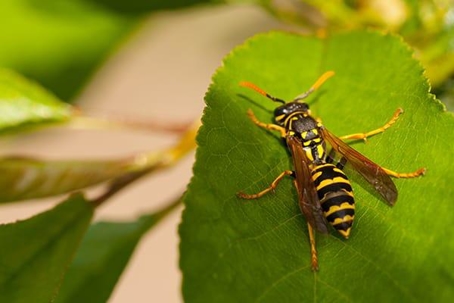Stinging insects buzzing around your property are a health hazard to friends and family. To avoid their stings, it's important to take measures to safeguard your home. Keep reading to learn more about the different types of wasps and hornets and what to do if you discover a nest on your property.
How To Identify Common Hornets And Wasps
There are several types of wasps and hornets found throughout the local area. Here is a list of the most common species, along with their identifying characteristics.
- Bald-faced Hornet: These insects resemble yellow jackets. They have long bodies and are usually black with a white face. They also have slanted line markings running alongside their bodies. Their nests are gray, have a paper-like appearance, and are enclosed.
- Paper Wasp: This type of wasp is brown with yellow-colored markings. They have long, thin bodies and long legs. Their nests look like they were made with paper and resemble upside-down umbrellas.
- European Hornet: Also known as the brown hornet or giant hornet. They are large and brown with a pale face and yellow stripes along the body. They prefer to nest in hollowed-out structures and walls.
- Mud Dauber Wasp: These wasps are shiny and black and have long, slender bodies. Unlike other types of wasps and hornets living in colonies, mud daubers live solitary lifestyles. Their nests resemble pipe organs, and they form them by constructing several tube-like structures.
- Yellow jacket: This insect has a black and yellow abdomen and a yellow face. Yellow jacket nests are made of chewed cellulose and look like paper cartons.
Proper wasp identification is essential when working to eradicate an infestation. If you spot any of these stinging insects on your property, call a trusted source of Leesville pest control, like The Original Bugman Pest Elimination, Inc.
Some Wasps Are More Aggressive Than Others
Most hornets and wasps are known for being aggressive towards humans and animals. They'll defend their colonies at all costs and will attack if they believe anyone is threatening them. Paper wasps are most active in the summer and early fall. Their stings are very painful, but they are less aggressive than some of the other stinging insects. Mud daubers are the most docile of the group and rarely sting. They are known for being too consumed with nest building and caring for their young to worry about potential threats, but we still recommend that you avoid getting too close to them.
On the other hand, yellow jackets and hornets are very dangerous and the most likely to attack. Yellow jackets are active in the late summer and early fall. They're attracted to protein sources and are a common unwanted guest at outdoor parties and barbecues. Unlike many bee species, yellow jackets don't lose their stingers and can sting a victim multiple times. Hornets also retain their stingers, so it's vital to protect yourself from these insects if you discover them on your property.
Five Eco-Friendly Wasp And Hornet Prevention Tips For Your Yard
Because of their dangerous stings, you'll want to take the necessary precautions to keep hornets and wasps away from your family. Try implementing these wasp prevention tips today:
- Keep doors and windows closed and repair holes in screens and exterior walls.
- Store outdoor garbage in cans with tight-fitting lids. Keep compost piles covered.
- Clean and cover your grill after cooking.
- Remove rotting fruit from fruit trees and the ground underneath.
- Plant flowers and shrubs that naturally repel wasps and hornets, like marigolds, geraniums, and basil.
If you find a hornet or wasp nest on your property, don't attempt to remove it on your own. Call for help from a pest control company instead.
The Safest Way To Remove A Wasp Infestation From Your Yard
The best way to get rid of a wasp nest is to work with a professional exterminator like The Original Bugman Pest Elimination, Inc. We've been keeping local homeowners and their families safe from dangerous stinging insects for over 30 years. To learn more about how we can help, give us a call today.
Schedule Your Free Inspection
Complete the form below to schedule your no-obligation inspection.

